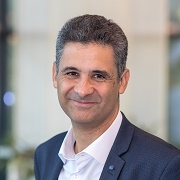Professor Karim Fizazi

Professor Karim Fizazi is a medical oncologist at Institut Gustave Roussy and Centre Oscar Lambret, as well as Professor of Oncology at Paris-Saclay University. He studied medicine at the University of Poitiers before completing his residency in Paris, where he qualified in 1995. After specialising in medical oncology at Gustave Roussy, he spent two years in the United States at MD Anderson Cancer Center (Houston), where he conducted research on bone metastases in prostate cancer. He went on to complete a PhD in cancer biology in 2003.
From 2005 to 2018, he led the Department of Cancer Medicine at Gustave Roussy. He was appointed full university professor in 2009. Today, he heads the genitourinary oncology group (covering prostate, kidney, bladder and testicular cancers) at Gustave Roussy and chairs the French Genitourinary Tumour Group (GETUG), a national research organisation in this field. He also serves as Associate Editor of the European Journal of Cancer, a leading international scientific journal.
Professor Fizazi is recognised as one of the world’s leading experts in prostate cancer and testicular cancer. He has authored over 500 scientific publications, and his work is regularly presented at major international conferences. For more than twenty years, he has worked to improve treatment options, particularly through clinical trials that have helped shape current standards of care. His research has led to better survival outcomes and improved quality of life for patients, with advances including new medications, optimised treatment combinations, more targeted use of radiotherapy or chemotherapy, and the development of innovative therapies such as second generation hormonal therapies, PARP inhibitors and radioligand treatments.
In 2013, he founded the PEACE consortium (Prostate Cancer Consortium in Europe) to support and coordinate clinical research at the European level. This academic network oversees several large-scale clinical trials designed to tailor treatment strategies to different patient profiles—ranging from high-risk localised cancers to metastatic disease and hormone-resistant tumours, as well as more vulnerable patient groups. These studies are exploring both combined and sequential therapeutic approaches, with the goal of improving outcomes, delaying progression and enhancing treatment tolerability.
Alongside his academic work, Professor Fizazi also leads several international clinical trials in partnership with the pharmaceutical industry, focused on evaluating new and promising therapies for genitourinary cancers.
